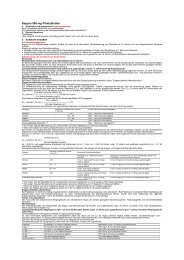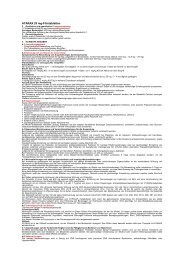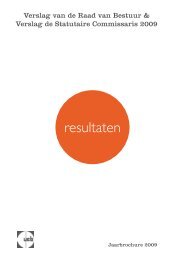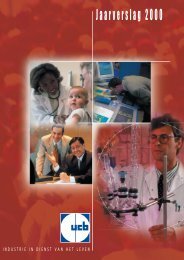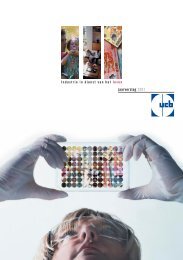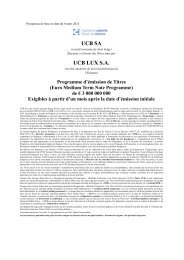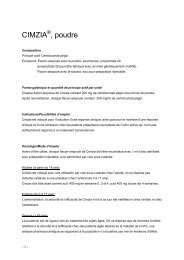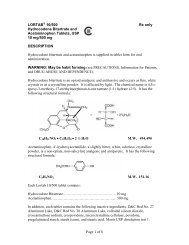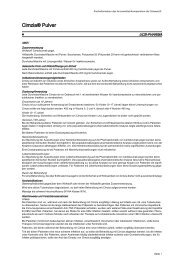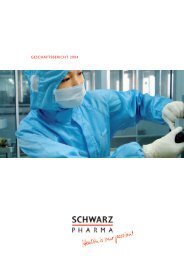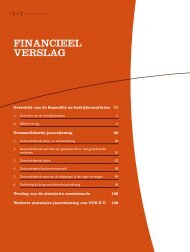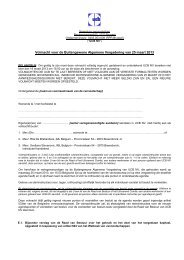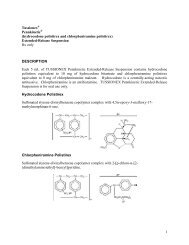UCB SA - BNP Paribas Fortis
UCB SA - BNP Paribas Fortis
UCB SA - BNP Paribas Fortis
Create successful ePaper yourself
Turn your PDF publications into a flip-book with our unique Google optimized e-Paper software.
Patent laws in <strong>UCB</strong>’s major markets are substantially similar, but the protection provided by a patent<br />
varies from country to country, depending on the type of claim granted, the scope of those claims’<br />
coverage (the way claims are interpreted) and the legal remedies available for enforcement. Although<br />
there are certain exceptions as to when and how generic pharmaceutical manufacturers may apply for<br />
regulatory approval with respect to patent expiry, patent protection in key markets such as the United<br />
States, Europe and Japan is generally strong.<br />
The <strong>UCB</strong> Group currently has approximately 510 active patent families, comprising approximately<br />
3,080 granted patents and 2,310 pending patent applications. Although patents are important to the<br />
business of the <strong>UCB</strong> Group, <strong>UCB</strong> believes that no single patent (or group of related patents) is material<br />
to the <strong>UCB</strong> Group’s business as a whole. However, the Issuer believes that patents relating to key<br />
products such as Cimzia®, Neupro®, Vimpat® and Keppra®XR are of particular importance.<br />
Term and Expiration of Patent<br />
The term of a patent varies depending on the laws of the particular jurisdiction which has granted the<br />
patent. However, in all jurisdictions which are of key importance to the <strong>UCB</strong> Group, patent protection,<br />
once granted, is valid for 20 years from the date on which the corresponding patent application was<br />
filed.<br />
The European Union, the United States, Japan and certain other countries provide extensions of patent<br />
term or supplementary protection certificates to compensate for patent term loss due to regulatory<br />
review thus allowing adequate time to recoup the substantial investment in research and development<br />
and regulatory approval of products. In accordance with its product life-cycle management policy, the<br />
<strong>UCB</strong> Group will seek such extensions wherever and whenever they are available.<br />
Although expiration of the basic patent protection for a product (usually the API or a key formulation)<br />
normally results in the loss of market exclusivity, the <strong>UCB</strong> Group may continue to derive commercial<br />
benefits from:<br />
• patents relating to specific uses for the API;<br />
• patents relating to novel compositions and formulations;<br />
• patents relating to processes and intermediates used in manufacturing the active ingredient; and<br />
• in certain markets (including the U.S. and the EU), market exclusivity under laws other than patent<br />
laws, in particular, regulatory data protection and exclusivity provisions.<br />
The following summary sets forth the expected expiration dates of the basic patent protection for key<br />
products of the <strong>UCB</strong> Group in its major markets (including any patent extensions, where applied for or<br />
already granted).<br />
Marketed Products EU U.S. Japan<br />
Keppra® (levetiracetam; API) September 2 2010 3 Expired None<br />
2<br />
The basic patent in Europe expires in May 2010 however data exclusivity applies to until September 2010 making this the date of expiration of<br />
exclusivity<br />
3<br />
Including extensions where applied for or already granted<br />
A11250830/2.25/23 Oct 2009 76



